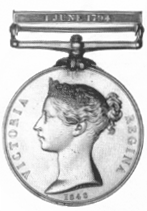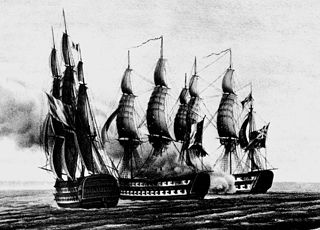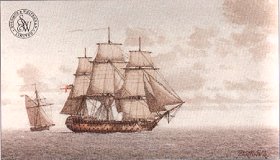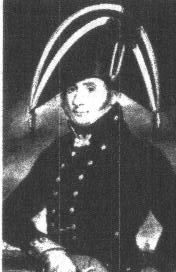Related Research Articles

The Battle of Trafalgar was a naval engagement that took place on 21 October 1805 between the British Royal Navy and the combined fleets of the French and Spanish Navies during the War of the Third Coalition of the Napoleonic Wars (1803–1815).

Vice Admiral Cuthbert Collingwood, 1st Baron Collingwood was an admiral of the Royal Navy, notable as a partner with Lord Nelson in several of the British victories of the Napoleonic Wars, and frequently as Nelson's successor in commands.

Trafalgar Day is the celebration of the victory won by the Royal Navy, commanded by Vice-Admiral Horatio Nelson, over the combined French and Spanish fleets at the Battle of Trafalgar on 21 October 1805.

Admiral Sir Victor Alexander Charles Crutchley was a British naval officer.

HMS Ajax was an Ajax-class 74-gun third-rate ship of the line of the British Royal Navy. She was built by John Randall & Co of Rotherhithe and launched on the Thames on 3 March 1798. Ajax participated in the Egyptian operation of 1801, the Battle of Cape Finisterre in 1805 and the Battle of Trafalgar, before she was lost to a disastrous fire in 1807 during the Dardanelles Operation.

HMS Neptune was a 98-gun second-rate ship of the line of the Royal Navy. She served on a number of stations during the French Revolutionary and Napoleonic Wars and was present at the Battle of Trafalgar in 1805.

Admiral Sir Philip Charles Henderson Calderwood Durham, GCB was a Royal Navy officer whose service in the American War of Independence, French Revolutionary War and Napoleonic Wars was lengthy, distinguished and at times controversial.

The International Fleet Review was the most recent Royal Navy review, continuing a tradition going back to the 15th century. It took place on 28 June 2005, as part of the Trafalgar 200 celebrations to commemorate the 200th anniversary of the Battle of Trafalgar in 1805. For the celebrations to mark Her Majesty's Diamond Jubilee in 2012, instead of a Fleet Review such as marked that of Queen Victoria, there was a cavalcade of boats down the Thames.

Scipion was a 74-gun French ship of the line, built at Lorient to a design by Jacques Noel Sane. She was laid down as Orient in late 1798, and renamed Scipion in 1801. She was first commissioned in 1802 and joined the French Mediterranean fleet based at Toulon, in the squadron of Admiral Leissègues. Consequently, she was one of the ships afloat in that port when war with England reopened in May 1803. She participated in the Battle of Cape Finisterre and the Battle of Trafalgar. The British captured her in the subsequent Battle of Cape Ortegal. In 1810 she participated in the Java campaign, which in 1847 earned her surviving crew the Naval General Service Medal. She participated in the blockade of Toulon in 1813 and was paid off in 1814. She was broken up in 1819.

Achille was a Téméraire-class 74-gun French ship of the line built at Rochefort in 1803 after plans by Jacques-Noël Sané.

The Naval General Service Medal (NGSM) was a campaign medal approved in 1847, and issued to officers and men of the Royal Navy in 1849. The final date for submitting claims was 1 May 1851. Admiral Thomas Bladen Capel was one of the members of the board that authorised the medal.

The Naval Gold Medal was awarded between 1793 and 1815 to senior officers of the Royal Navy for specified actions.

HMS Swiftsure was a 74-gun third rate ship of the line of the British Royal Navy. She spent most of her career serving with the British, except for a brief period when she was captured by the French during the Napoleonic Wars in the action of 24 June 1801. She fought in several of the most famous engagements of the French Revolutionary and Napoleonic Wars, fighting for the British at the Battle of the Nile, and the French at the Battle of Trafalgar.
Captain John Stockham was an officer in the Royal Navy during the Napoleonic Wars, whose career is now obscured to the point that very little of his life is known up until 1805, when he was suddenly and unexpectedly called upon to command the ship of the line HMS Thunderer at the Battle of Trafalgar.

HMS Edgar was a 74-gun third-rate ship of the line of the Royal Navy, that saw service in the American Revolutionary, French Revolutionary and Napoleonic Wars. Launched in 1779, she fought in the battles of Cape St Vincent and Copenhagen, two of the major naval engagements of the wars.

Commander James Spratt born in Dublin (1771–1853), was an officer in the Royal Navy and became known as one of the heroes of the Battle of Trafalgar. Spratt was also the father of Thomas Abel Brimage Spratt, English vice-admiral, hydrographer and geologist.

HMS Victory is a 104-gun first-rate ship of the line of the Royal Navy, she is the world's oldest naval ship still in commission. With 245 years' service as of 2023, ordered in 1758, laid down in 1759 and launched in 1765 - she is best known for her role as Lord Nelson's flagship at the Battle of Trafalgar on 21 October 1805.

The Naval Museum of Halifax is a Canadian Forces museum located at CFB Halifax in the former official residence of the Commander-in-Chief of the North America Station (1819–1905). Also known as the "Admiralty House", the residence is a National Historic Site of Canada located in Halifax, Nova Scotia, Canada. The museum collects, preserves and displays the artifacts and history of the Royal Canadian Navy.
Nancy Perriam was an English woman who served in Royal Navy warships during the Napoleonic Wars. Born Ann Letton and also known as Ann Perriam, she originated from Exmouth, Devon. She fought in several notable naval battles, including the Battle of the Nile in 1798, serving as a powder monkey and medical assistant. When not in battle she assisted with the domestic needs of officers. In retirement Perriam worked as a street seller of fish; she was one of three women denied the Naval General Service Medal in 1847 because of their sex.
Hilary L. Rubinstein is an Australian historian and author. She researches and writes on British naval history and modern Jewish history.
References
- Stark, Suzanna J. (Spring 1997). "Women at Sea in the Royal Navy in the Age of Sail". The American Neptune. 57 (2): 101–123.